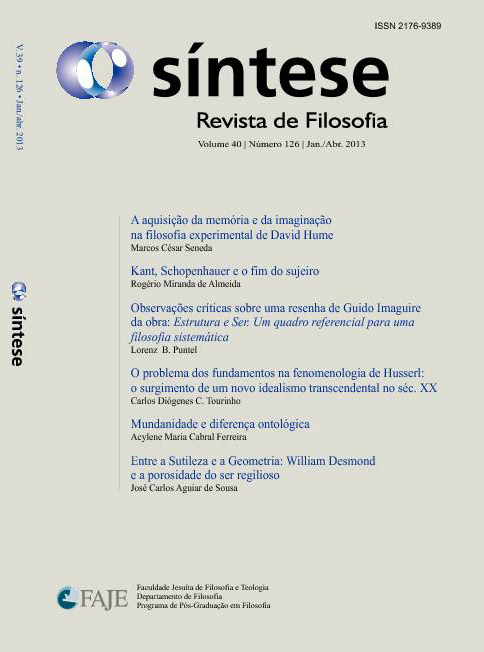O PROBLEMA DOS FUNDAMENTOS NA FENOMENOLOGIA DE HUSSERL: O SURGIMENTO DE UM NOVO IDEALISMO TRANSCENDENTAL NO SÉC. XX
DOI:
https://doi.org/10.20911/21769389v40n126p73-84/2013Palavras-chave:
Edmund Husserl, “Prolegômenos”, psicologismo, logicismo, experiência.Resumo
Resumo: Concentrando-se nos “Prolegômenos” de Husserl, o presente artigo aborda os argumentos do psicologismo e do anti-psicologismo no que se refere ao tema controverso das relações entre a Psicologia e a Lógica. Mostra-nos que o caminho trilhado pelo psicologismo conduz a um ceticismo nocivo à filosofia, enquanto o anti-psicologismo incorre em uma espécie de “logicismo dogmático”, para o qual estariam cortadas as relações com a experiência. O artigo destaca, então, o desafio de Husserl: encontrar um terceiro caminho em relação ao lugar da experiência no legítimo conhecimento, sem que tal caminho incorresse no ceticismo resultante do psicologismo, nem tampouco na tautologia do logicismo dogmático.
Abstract: Focusing on Husserl's Prolegomena, the present paper approaches the arguments of psychologism and anti-psychologism with regard to the controversial topic of the relationship between psychology and logic. It shows us that the path taken by psychologists leads to a skepticism harmful to philosophy, while anti-psychologism incurs a kind of “dogmatic logicism” that would cut off the relations with experience. Therefore, this article highlights Husserl's challenge to find a third way regarding the role of experience in true knowledge, without falling into either the skepticism of psychologism, or the tautology of dogmatic logicism.






























